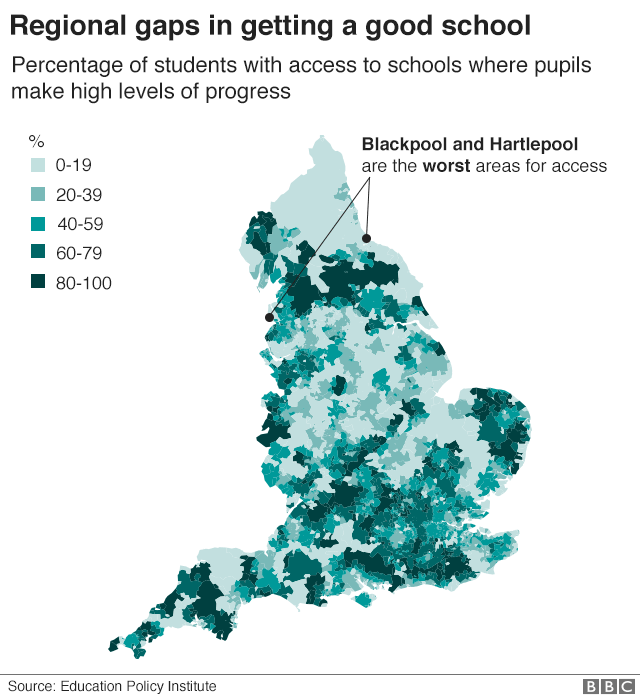Born in the wrong place for good schools?
- Published
- comments

The report warns that regional gaps in good schools have grown wider in recent years
There is a widening geographical divide in access to high-performing schools in England, says a report from the Education Policy Institute.
Between 2010 and 2015, London took an increasing share of the secondary schools where pupils were most likely to make good progress.
But the report says areas in the North and North East were being left behind.
A Department for Education spokeswoman said social mobility plans would help chances to be spread more evenly.
The report picks up on concerns about social mobility now being increasingly affected by where families live - with disadvantaged youngsters in London having a much better chance of going to good schools than similarly deprived pupils in other parts of the country.
David Laws, the think tank's chairman and a former education minister, said the widening inequality was "shocking".
In this study, "high-performing" schools are not those with the best exam results or rated as outstanding or good but those that are in the top third for how much progress pupils have made since starting secondary school.
Deprivation levels
The report says that a number of London boroughs are stretching further ahead in the density of such schools.
Harrow, Hillingdon, Brent, Ealing and Camden are among those with the greatest increases in such schools with a high level of value added.
Among the 20 top authorities by this measure, 16 are in London.
The authorities with a decreasing number of such high-performing schools are clustered in the North and Midlands, including Blackburn, Derby, Wirral, Warrington and Dudley.

Young people in Blackpool and Hartlepool are named as having the least access to local secondary schools where pupil progress is in the top third by national standards.
The analysis shows how levels of deprivation are not necessarily linked to the availability of high-performing schools.
Haringey has 29% of pupils eligible for free school meals, but has among the country's highest densities of successful schools, in terms of value added.
This measure of disadvantage is higher than any of the bottom 10 authorities with the least availability of good value-added schools.
Better funding
"It is shocking to see that over recent years the access to high-quality secondary school places in England has become even more unequal," said Mr Laws.
"In one-fifth of local areas, children cannot access quality secondary school places. government rhetoric about spreading opportunity is not being matched by experience in areas such as the North, North East and parts of the Midlands."
Geoff Barton, leader of the ASCL head teachers' union, said: "The answer of course is pretty simple."
He said schools needed better funding, to be able to recruit high-quality teachers and to have a longer-term approach to keeping the best teachers and head teachers.
A Department for Education spokeswoman said that a new plan to promote social mobility was designed "to make sure opportunities are spread evenly across the country".
"That's why we are targeting the areas that need the most support through the £72m opportunity areas programme, and by investing £280m over the next two years to target resources at the schools most in need to improve their performance and deliver more good school places."